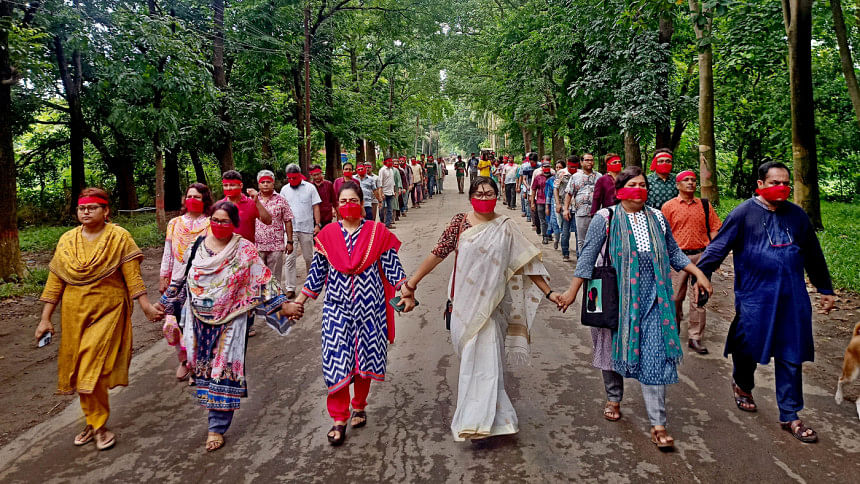July 30, 2024: The red wave of defiance

Amid continued mourning and mounting outrage, July 30 marked a powerful day of nationwide protests and symbolic resistance, as students, teachers, guardians, and citizens rallied across Bangladesh demanding justice for the lives lost during the quota reform movement. From campus demonstrations to courtroom reflections and diplomatic reactions, the country witnessed an outpouring of grief, defiance, and demands for accountability.
The High Court expressed deep sorrow over the deaths resulting from the recent unrest. "These deaths are sad for all of us," said a bench of Justice Mustafa Zaman Islam and Justice SM Masud Hossain Dolon during a hearing on a writ petition related to the violence.
At Jahangirnagar University, teachers and students staged a silent protest under the banner "Jahangirnagar Against Oppression." With red cloths covering their mouths and parts of their faces, they marched from the university's Shaheed Minar around 12:30pm, condemning the harassment, detention, and torture of students and calling for a thorough investigation into the indiscriminate killings. Faculty members at Rajshahi University, under the banner "RU Teachers Against Oppression," organised a similar demonstration. Over 200 teachers participated in the procession that began at the Shaheed Intellectual Memorial at 11:30am and ended with a rally at the university's main gate.
In Khulna, hundreds of students blocked the Shibbari intersection around 11:30am for more than three hours, chanting slogans like "Shooting won't stop the movement" and "One point, one demand—step down Sheikh Hasina." Many citizens joined the demonstration in solidarity. "Bullets bought with our fathers' tax money are being used against us," said one protester. "We demand justice for the students who were shot and killed."
In Tangail, quota reform protesters wearing red badges attempted a march on Registrypara Road around noon. However, police intercepted the procession near the Girls' School intersection, preventing it from continuing.
Online, a wave of digital protest swept across platforms. Students, teachers, guardians, and others changed their profile photos to solid red in solidarity with the Anti-Discrimination Student Movement's call. The action defied the government-imposed restrictions on websites, including Facebook, with many users bypassing the blocks using VPNs. The movement had rejected the government-declared nationwide mourning.
A fresh wave of mobilisation was announced in the evening. The Anti-Discrimination Student Movement, through a press release signed by one of the coordinators Abdul Hannan Masud, called for a "March for Justice" to be held at all educational institutions, court premises, and major roads next day. Their nine-point demand included an apology from Prime Minister Sheikh Hasina, the resignation of several ministers—including those of Home, Education, Law, Information, and Communications—and the dismissal of top police officials in districts where students had been killed. They also demanded the resignation of university vice-chancellors and proctors who had failed to protect peaceful protesters, immediate reopening of all institutions and dormitories, and the withdrawal of military, BGB, Rab, and police forces from campuses.
International voices added to the pressure. UN Secretary-General António Guterres expressed concern over reports of excessive use of force and credible evidence of human rights violations. EU Foreign Policy Chief Josep Borrell condemned the shoot-on-sight orders and unlawful killings, calling for thorough investigations and accountability.
According to official data, the government put the death toll at 150. However, The Daily Star's count showed at least 163 confirmed deaths, with fears the actual toll could be even higher. Many critically injured patients were admitted to hospitals that reporters could not access, and numerous families had collected bodies privately without media contact.
At least 354 more people were arrested in the last 36 hours till 6:00pm on July 30, bringing the total number of arrests to 10,488 since July 18. Police filed 672 cases in the capital and 51 districts. Of the latest arrestees, 215 were taken into custody from 29 districts. The Dhaka Metropolitan Police produced 139 arrestees before the Chief Metropolitan Magistrate's Court, where most were sent to jail and some placed on remand.
Prominent citizens, under the banner "Aggrieved Citizen Society," held a press conference at the Dhaka Reporters Unity, accusing the government of being largely responsible for the deadly crackdown. Transparency International Bangladesh Executive Director Iftekharuzzaman questioned the justification for holding protest leaders "for their safety" and asked if similar security would be extended to all citizens.
Meanwhile, police barred a group of guardians under the banner "Santaner Pashe Obhibhabok" from holding a sit-in in front of Dhaka Medical College. The parents had planned to demand answers regarding the deaths of their children.
The government announced its intention to ban Jamaat-e-Islami and its student wing, Islami Chhatra Shibir, for their alleged involvement in recent "anti-state activities." Law Minister Anisul Huq made the announcement a day after the Awami League-led 14-party alliance recommended the ban. BNP Secretary General Mirza Fakhrul Islam Alamgir questioned the timing of the decision, calling it a ploy to distract from the ongoing crisis.
Amnesty International, in an open letter to Prime Minister Sheikh Hasina, demanded the immediate lifting of the curfew and restoration of full access to social media. The letter also urged the government to ensure that shoot-on-sight orders and internet shutdowns would not be used again to suppress protests or curtail fundamental rights.
The events of July 30 bore witness to a fractured nation grappling with grief, fury, and a deepening crisis of trust. While red became the colour of resistance—on campus, online, and on the streets—the government's escalating crackdown and denial of responsibility further inflamed public sentiment. As the international community watched with alarm and citizens demanded justice with unrelenting courage, the question remained—will the state listen before the damage becomes irreversible?

 For all latest news, follow The Daily Star's Google News channel.
For all latest news, follow The Daily Star's Google News channel. 



Comments